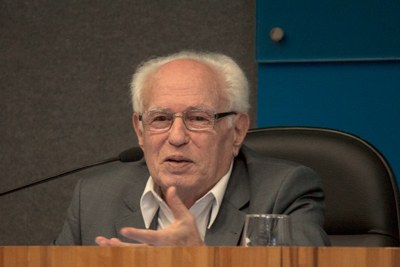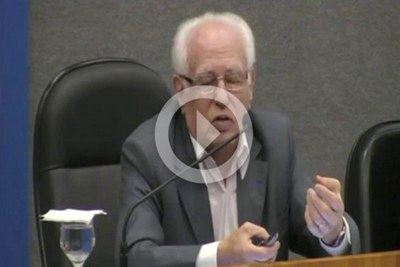Goldemberg Talks about USP’s Contributions to Society
Physicist José Goldemberg, former president of the University of São Paulo and former minister of Education, was the first speaker at the Intercontinental Academia (ICA) on the morning of April 20. He talked about the history of the university, its role in international education and research, and the challenges thrust upon it.
The conference was part of the ICA’s complementary program to discuss the future of universities. The issue will also be examined on April 24, during a morning meeting with the minister of Education, Renato Janine Ribeiro, and an afternoon seminar with presidents of state and federal universities in São Paulo.
Goldemberg recalled that universities came late in Brazil, partly because of restrictions imposed by the Portuguese Crown in the colonial period. He added that, unlike other centenary universities that developed naturally, the University of São Paulo was built according to a plan, at a time when industrialization was thriving and there was a need to restructure the educational system and to expand the supply of skilled labor.
According to him, the creation of USP in 1934 benefited from the fact that numerous European intellectuals were dissatisfied with the political direction their continent was taking. “They were persuaded to come and take part in establishing the university, which began with the existing schools of Law, Medicine and Engineering, and grew with the addition of other colleges.”
For Goldemberg, two facts were particularly relevant to the success of the initiative: the adoption of a full-time professorship regime and the total funding of the university by the state government.
80 years
In 2014, Goldemberg chaired the committee in charge of the celebrations of USP’s 80th anniversary. One of his tasks was to organize a book on the occasion and, toward this end, a questionnaire was sent to 52 directors of education and research units, specialized institutes, and museums. One of the questions inquired what the unit had done throughout its history as a contribution to society. Goldemberg said some of these officers didn’t know how answer the question. To him, this shows how much the role of the university remains undefined for a large number of scholars.
Related material
Opening: Opening of the Intercontinental Academia Highlights the Project’s Uniqueness and Relevance |
|---|
He said the University of São Paulo consumes 5% of state taxes, equivalent to approximately US$ 2 billion, and that the average student costs US$ 2,000 per month. “Even if there are many excellent courses and others not so good, regardless of the resources invested,” he considers that a wholly State-funded university might be a good template for developing countries.
With regard to international comparisons, Goldemberg relied on the Times Higher Education ranking, where USP appears among the 201-225 best-rated institutions. He agreed that this position is not extraordinary, but “considering the number of countries with higher ranking universities than USP, we find that there are 150 countries in the world that do not have a similar university, and this says a lot.”
For him, USP’s ranking shows that the university has the ability to educate well-informed individuals about the world and which technologies are being tested or need to be developed.
Goldemberg exemplified this with the pursuits of certain schools, such as ethanol research headed by Luiz de Queiroz Agricultural College (ESALQ), in Piracicaba, “which made it possible for half the gasoline Brazil needs today to be replaced by sugarcane ethanol.”
During his exposition, Goldemberg displayed graphs of Brazil’s and USP’s scientific production, and concluded that the number of papers published abroad has increased. “This could be an excellent growth indicator of our output; however, the impact of the articles is still low, a little over 0.6 for Brazil and 0.7 for USP if we take ‘1’ as an international average” [being the number of citations an article receives].
He recalled that in addition to the contributions to applied natural sciences and engineering, one must also highlight a number of other relevant contributions to society that are not properly computed in the ratings. He mentioned as an example the contributions of Law School professors, which have become reference in many trials and legal opinions, and played a decisive role in drafting proposals that turned into laws, such as the Consumer Protection Code (Law No. 8078/90).
Another outstanding feature of the University of São Paulo, in his view, is the role of numerous professors in political, institutional and social activities, such as the creation of political parties, work in the first echelon of federal, state and municipal governments (even as head of the Executive branch), and special initiatives, such as the Truth Commission that aims to elucidate crimes committed by the military dictatorship.
 At the end of his exposition, Goldemberg made an analogy between the ICA’s interdisciplinary and interactive academic proposal, and the role of the IEA, created during his tenure as USP’s president: “The IEA was created to stimulate interaction between the various groups of the university, in all scientific areas.”
At the end of his exposition, Goldemberg made an analogy between the ICA’s interdisciplinary and interactive academic proposal, and the role of the IEA, created during his tenure as USP’s president: “The IEA was created to stimulate interaction between the various groups of the university, in all scientific areas.”
Debate
During the ensuing debate, biologist Eduardo Almeida, one of the young participant scholars, asked Goldemberg if by taking part in projects such as the ICA (which are interdisciplinary and difficult to assess by the usual evaluation procedures) young scholars might not be swimming against the current and producing less than they might in their area of research. Goldemberg’s answer was succinct and to the point: “I don’t agree. Being in contact with scholars from other fields leads to greater creativity in one’s own area.”
Asked by physiologist Carolina Escobar which strategy could be adopted to encourage low-production professors to produce more, Goldemberg said that usually administrative statutes do not allow their dismissal and that, therefore, it is up to department heads to be more active in demanding productivity.
To a question from statistician Caio Dantas, former dean of Undergraduate Studies at USP and currently a researcher at the IEA, on how to evaluate scholars who don’t have a significant production papers but are very active in stimulating the work of research groups and the development of students, Goldemberg said that one of the ways might be the institution of awards, as occurs in other areas of knowledge, such as the arts.
Martin Grossmann, director of the IEA, asked what Goldemberg would recommend to young researchers participating in the ICA. The answer came in one word: “Aggressiveness.”
Report by Mauro Bellesa
Translation by Carlos Malferrari

